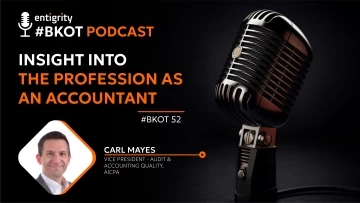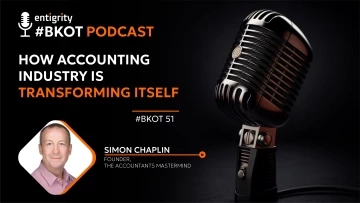Our experts Chris Rivera and Ryan Lazanis have discussed offshoring and how this can help them build in future firms in this podcast.
#BKOT 39: BUILD A KICKASS OFFSHORE TEAM
OFFSHORING AND FUTURE FIRMS
Hosted by: Chris Rivera, Director Client relations, Entigrity Offshore Staffing
Guest: Ryan Lazanis, Founder, Future Firms
Transcript
Chris: Hey everybody! My name is Chris Rivera, Director of Client Relations, Entigrity Offshore Staffing, and today we're speaking with Ryan Lizanis of futurefirms.com and he's based in Canada. And Ryan how things have been, just I saw you a couple of weeks ago.
Ryan: Yeah it's gonna be so good Chris. Good to catch up with you and thanks for having me on the show.
Chris: Yeah for sure. So Ryan let's kickstart this. You have a great story, especially how it ties in the experiences you saw with your family, and then what you wanted to do in your entrepreneurial spirit and how you're helping the accounting community. I truly love it because I don't have an accounting background but the drive and the passion that's what I do have so I can relate there. So can you tell us a little bit about that?
Ryan: Sure! So a little bit of background on myself. I'm a CPA, born and raised here in Montreal Canada and I started my own accounting firm in 2013 called Xen Accounting was an online firm, one of the earlier online firms in North America, and was kind of following my father's footsteps. He was an entrepreneur, a small business owner and I knew I wanted to have a business on my own one day. So I started my own firm and one of the big themes of my firm was how I could make accounting easy and pain-free, for not only small business owners but also for those working in the firm.
And I identified a lot of pain points as I started my accounting career working at a firm myself and I had a lot of colleagues working in firms and I didn't want that typical traditional model. So this might tie in a little bit later on in our conversation, but there were a lot of pain points that I eliminated from the get-go. To just help make accounting easier for everybody involved and I ended up growing the firm over a five-year period.
My firm was acquired by a large corporate services firm based out of Europe. Five years after starting my firm from scratch, it was acquired and now with a future firm we help accountants providing content and coaching to help fast-track a modern scalable firm they love. So I have a blog, podcast, newsletter all with actionable content and I have an online coaching membership called future firm accelerate which provides online courses. A fantastic community of several hundred modern entrepreneurial firm owners collaborating on best practices and coaching for myself whenever anybody gets stuck basically. So that's what I'm up to at the moment.
Chris: I love it and it's very important what you do right, and so that it's exciting to speak with you because accounts sometimes aren't the best business owners. They just kind of open up a practice, fall into this whole business model, and off they go. And it's hard to build out strategies and build out game plans and figure out how to really execute this.
Ryan: And you know what, I certainly understand that because I was one of those people that just opened up a firm and just fell into it. Now I think I was a better business person than an accountant, I'm actually a terrible accountant. So out of necessity, I had to bring smarter CPAs onboard very early on to get me out of the work because that was a hazard.
So yeah I definitely identify more with the entrepreneurial end of things but I understand what firm owners go through is because there's no plan. You just fall into it and things happen and it snowballs into something down the road.
Chris: Yup and then money starts coming in and it looks good and clients are happy more business is coming in but still there's just no structure in place. We can talk about subscription-based pricing, we could talk about how to build a team, we could talk about hierarchy, there are just many different aspects but when it boils down to it, the keyword is capacity right. So however you go about doing this you have to have the capacity.
So initially when you're working with a firm, what are you noticing right away and also what tends to be the attitude with the pheromone. Is there a lot of excitement? Is there a lot of hesitation? Is there a lot of nervousness?
Ryan: I think it's something where we know what firm life looks like and it's not what a lot of people aspire to. Generally speaking, there's a pervasive issue in the industry with overwork and poor work-life balance. And I recognize that very early on in my accounting career when I started my firm like people start a business in the first place to improve their life to give them more freedom, and I was very stubborn with certain things from the get-go like I said I wanted to provide an easy pain-free accounting experience, not just for clients but for the team.
There was several pain points I identified which might loop into a little bit of our discussion is one of those pain points was:
- People hate their timesheets; so why continue to force people to do something that they hate.
So right off the bat when I started my firm there are no timesheets, people hate their timesheets, I want to attract people to the firm, so there are no timesheets in the firm but that opened up other issues which led to other solutions but you know that's just an example of there's a lot of things that people don't like about firm life but we continue doing it.
And there are some pervasive issues in the industry with overwork and poor work-life balance. Yeah, so that's kind of what I observed as an outsider before starting my own firm.
Chris: Now two keywords you just said were bad habits. I noticed that too. For example when speaking with a client and they had an experience where it wasn't so good with offshore staff specifically and so in the discussion, I find out that there was a point of contact onshore that was working with the offshore team member and they always had to correct the work, and I was like oh wow! So how long did this go for a week or two? No, it went on for about four and a half months, and so I assumed right that's understandable to have that experience and so what happened with the offshore company, they let them go but they wanted to try it again because they felt like it could work.
The same thing happened except this time they allowed it to go two months so you're talking six months of allowing repeatable behavior which was beneficial to nobody and I see that continuously happen in the attitude if you would address it right then and there it could be easily understood by both parties and then you move on and holding everybody accountable. And but a lot of times with just the attitude it doesn't go so well.
Ryan: So surprisingly everybody's up to here all the time and probably even up to here right. So yeah that's one of the issues with the industry.
Chris: So when working with a firm and what are some of the things that you notice right away that need to be addressed and is it the same with every firm or is it different depending on the aspect of what they're doing for their clients.
Ryan: I think most firm owners that I'm working with are looking to create a scalable model. They want to create a model that runs systematically in a repeatable fashion like clockwork and the number one thing that I see is people coming to me saying we need more technology, we need better processes and oftentimes when I pull back the hood a little bit that's not really the issue at hand the first instinct is we need more automation, we need more technology, that's going to solve all our problems.
That's going to make everything else go smoothly. That's just one part of the solution there's
- Operational matters that need to be attended to,
- There are capacity issues that need to be attended to,
- There's more standardization across the business model that needs to be attended to.
So the first instinct is not often the correct instinct so that's typically what I see with firms coming to me for help.
Chris: Now you're working with them and so when you're providing some insight on how to kind of offload tasks or think about their staff in general, now do you always go into wanting them to add additional staff, Are you wanting them to kind of identify better processes, or stronger support staff as far as what they're actually capable of doing.
Ryan: It obviously depends, usually what I'm doing is I'm working helping focus on the fundamentals of the business first because it's just a mishmash of different things, the mishmash of different clients, a mishmash of different types of service offers, and it's very hard to scale everything different.
So we have to have some levels of standardization so I'm looking at the fundamentals of the business first, who they're targeting, what their service offers to look like, what their value proposition is. Just getting alignment there and then often you know I'm working typically with smaller firms so let's say under a million bucks but often like the owner or the partner is just totally overloaded and taken up. All sorts of clients work on their shoulders which is something that just can't happen if you're looking to grow your business. So certainly looking at capacity is the next thing because I often hear who I hire next when I hire this person, what should I take off my plate and it all comes down to capacity.
Capacity planning is the key to everything yet very few firms engage in it. Your capacity is your scarcest resource, we need to protect that resource and then manage it and that's not happening at most firms.
Chris: Yeah I noticed the same thing where clients are coming and into meetings and they they have needs across all the board and they just want audit and tax and accounting and bookkeepers and throw in some admin support staff and then they go about it in a way of starting across everywhere and they've never done this before.
And so just like you're saying we need you've got to streamline it and I say identify the most pressing need and you start there. And then it'll be so much easier to realize, okay so when you hire in general just on board you got to work everything out but then you'll realize, wait a second you may not need these associates in different departments because you know they're cross-trained and they can assist right and so yeah if you're all scattered and everything's not organized then it could get really messy. So I always say just start pinpoint what's your most pressing need and you build from there right and then it's always a combination where identify the strengths of the onshore team and identify the strengths of trying to build out an offshore team.
Ryan: Yeah I would certainly agree with that.
Chris: I know you don't have much experience working with offshore staff but in how the model that you're in and us being remote workers. I mean what are your thoughts on this going forward this whole concept and how it can help today's accounting firms.
Ryan: So I started my firm in 2013 sold it in 2018 and certainly offshoring has only picked up steam since then and it was something near the tail end of when I was leaving my firm that I started looking into a little bit more seriously and I have no doubt that I would probably have had some kind of an offshore team in my firm if I was running one today.
So I have a virtual assistant currently with a future firm, she's offshore so I'll probably be building out more resources offshore specifically for my future firm company. So I feel very good about it, we're utilizing resources in different parts of the world. It's very hard to find those resources. One of my biggest challenges, when I was running a firm, was finding people, and it's been like that forever so why don't we widen the pool of people.
When I started my firm one of the benefits was that I was a virtual model early on in that space. I was able to hire people across the country so that was a big win but that gap is now narrowed because everybody's working like that now. And that was a huge selling point before, like even hiring team members from a remote fashion.
Now that's not a selling point anymore so we need to just maintain our competitiveness and I think offshoring is one of those ways that you can do so.
Chris: Spot on! When I went into this position myself four years ago, I specifically went into it because I wanted to work remote and then I realized after some interviews that it's my office is pretty far it's in India, I mean we're headquartered here in America but the day-to-day interactions would be myself and a computer and all the technology out there and it wasn't easy.
I thought I could get it on everything. I've been running for a few weeks, No. It took about six-seven months to really hone in and realize discipline structure, how to separate breaks and designing a workspace all that.
And so are you seeing a lot of firms have a hybrid office or they are all back in the office or they've gone remote. How do you feel, how comfortable they are in working in that type of environment?
Ryan: So I have some personal experience there because when I started my firm I was an in-person firm only working with clients virtually but the team was centralized in an office, then moved to a hybrid model which I found to be the most difficult type of model in my personal view because you're managing different cultures I guess.
I preferred the fully remote model the most, which my firm moved towards in the last few years that I was running my firm. Most of the firms that I'm working with I would consider them modern firms, so they're mostly online firms from the get-go and they're comfortable working in that manner and I kind of take that for granted truthfully and I might be in a bit of a bubble there but I've had some firms that I've coached that have had to move during Covid to a more remote model some of them are moving more back to an office. Honestly, I'm more of a virtual guy but I don't want to dictate anything to anyone because I think any of those approaches can work well, but you need to have the structure as you mentioned because the chances are you're probably going to have some people working remotely and there has to be a structure to it.
It has to be intentionally done to keep the team and culture together. So any of those approaches could work but very likely you're probably going to have some kind of hybrid approach moving forward at the very least.
Chris: And no matter whether you're onshore in an office, onshore remote offshore remote it's always about one team right. One cohesive working unit and for I've seen it happen towards it becomes like a battle. It's like the offshore versus the onshore team, it's not gonna work right and so there always has to be buy-in and mindset from everybody whether your firm has one partner - two partners or has 20 partners.
Ryan: I fully agree. A team has to be completely on the same page. It's not about just shipping work somewhere and some kind of silo-like team has to be part of the culture.
Chris: Yeah for sure and that's difficult and it's really difficult. Simply because my experience starting working remote I was very confident I was all gung-ho and I was like what the heck do I do and so yes there are hesitations, there's going to be the hiccups there's going to be I hate using failures but you know failure is always going to lead to success and I feel that that word change is just like frightening and change is constant.
Even when I work with a firm they say I've been doing this for 30 years the same way and but yet we're on a call so something happened, something's about to change and even that point the attitude is like I guess I have to change but it should be like well I want to see what options are and so I'm a strong believer to have the right mindset going into whether you're restructuring your firm whether they're hiring just your everyday aspect and working with your team.
Ryan: Yeah I agree with you there Chris.
Chris: Alright! so the last few things Ryan. Any final thoughts for our audience out there today as far as where they stand now and how they can you know become that future firm.
Ryan: Yeah so at the end of the day, what's helped me along at least is just being really focused on what I help firms with is not necessarily create the biggest business in the world but create a business that they love and really focus on your personal goals and making sure that your business is in line with those personal goals because again we start a business, we run a firm with the idea of improving our life making our life better and what we often see in the industry as I mentioned earlier on is overwork, lots of stress and crazy busy seasons and this is not why we got into business in the first place.
So we have to understand what we really want out of life. A lot of people don't take that step back, certainly, that was me. I started a business, I just got into my firm and I just started growing it without even thinking about the end goal but we have to be very clear about what we really want out of life and then reverse engineer a plan to help us get there and our business should be part of that plan.
So yeah I know it's a very broad piece of advice but that's one thing that kind of helps me through running my businesses.
Chris: I agree if you're always running around and trying to just see the whole throw a bunch of darts see what sticks whatever that cliche is saying is it's just not gonna work and you really have to dig down and find what your passion is what you want to do, what you want to do for your team, what do you want to do for your clients and once you have that in place everything else will grow but it's always been a mindset and attitude. And everyone will be fine. So well Ryan, thanks a lot for joining today, appreciate your insight here and we will talk soon.
Ryan: Thank you very much, Chris, I appreciate it.
Entigrity™ is a trusted offshore staffing partner to over 550+ accountants, CPAs, and tax firms across the US and Canada. Our flexible and transparent hiring model helps firms of all sizes hire staff for accounting, bookkeeping, tax preparation, or any other task for 75% less cost. As a firm 'run by accountants, for the accountants', Entigrity captures the hiring needs of accounting firms most precisely, providing staff that works directly under your control and management, still, you are left with least to worry about compliance, payroll taxes, overheads or any other benefits.

_1642676318-1686039629.webp)



